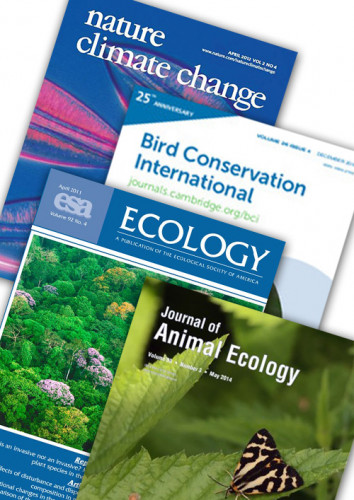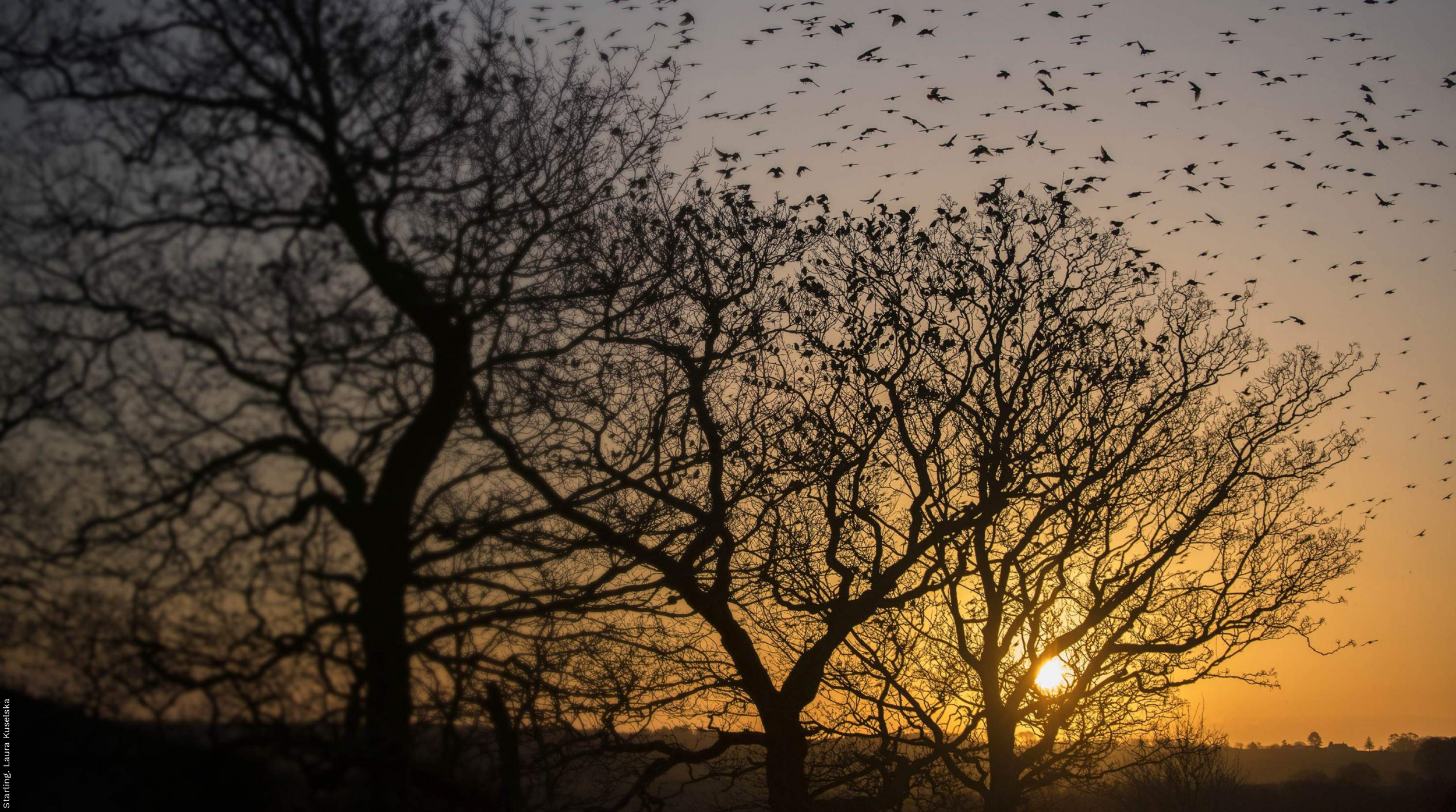Peer-reviewed papers

It is BTO’s policy to make public the results of our research. Our aim is to publish as much as possible of our work in the peer reviewed scientific literature. Many results are also published in our BTO Research Report series.
2024.
The benefits of protected areas for bird population trends may depend on their condition.
Biological Conservation
292
Link to Article (DOI: 10.1016/j.biocon.2024.110553)
2024.
Synchronous timing of return to breeding sites in a long-distance migratory seabird with ocean-scale variation in migration schedules.
Movement Ecology
Link to Article (DOI: 10.1186/s40462-024-00459-9)
2024.
Fidelity and distance to previously visited sites throughout the annual cycle in a trans-Saharan migrant, the Common Cuckoo.
Journal of Avian Biology
Link to Article (DOI: 10.1111/jav.03183)
2024.
Cross population comparison of complex migration strategies in a declining oceanic seabird.
Marine Ecology Progress Series
730
: 113-129
Link to Article (DOI: 10.3354/meps14533)
2024.
Characterisation, prevalence and severity of skin lesions caused by ophidiomycosis in a population of wild snakes.
Scientific Reports
14
Link to Article (DOI: 10.1038/s41598-024-55354-5)
2024.
Challenges in quantifying the responses of Black-legged Kittiwake to habitat variables and local stressors due to individual variation.
Bird Study
Link to Article (DOI: 10.1080/00063657.2024.2305169)
2024.
Species- or habitat- based assessments of vulnerability to climate change? Informing climate change adaptation in special protection areas for birds in England.
Biological Conservation
291
Link to Article (DOI: 10.1016/j.biocon.2024.110460)
2024.
Understanding population change: the value of the EuroCES constant-effort ringing programme.
Ringing & Migration
38
: 18-28
View Abstract
Link to Article (DOI: 10.1080/03078698.2024.2311771)
2024.
Anthropogenic climate and land-use change drive short-and long-term biodiversity shifts across taxa.
Nature Ecology & Evolution
Link to Article (DOI: 10.1038/s41559-024-02326-7)
2024.
Leakage of plastics and other debris from landfills to a highly protected lake by wintering gulls.
Waste Management
177
: 13-23
Link to Article (DOI: 10.1016/j.wasman.2024.01.034)
2024.
Using butterfly survey data to model habitat associations in urban developments.
Journal of Applied Ecology
Link to Article (DOI: 10.1111/1365-2664.14583)
2024.
Avian responses to climate extremes: insights into abundance curves and species sensitivity using the UK Breeding Bird Survey.
Oecologia
Link to Article (DOI: 10.1007/s00442-023-05504-9)
2024.
Behavioural responses of Sandwich terns following the construction of offshore wind farms.
Marine Biology
Link to Article (DOI: 10.1007/s00227-023-04353-7)
2024.
Extended moult phenology models improve inferences about moult duration and timing.
Ornithology
Link to Article (DOI: 10.1093/ornithology/ukae003)
2024.
Remote tracking unveils intercontinental movements of nomadic Short-eared Owls Asio flammeus with implications for resource tracking by irruptive specialist predators.
Ibis
View Abstract
Link to Article (DOI: 10.1111/ibi.13304)
2024.
Distance functions of carabids in crop fields depend on functional traits, crop type and adjacent habitat: a synthesis.
Proceedings of the Royal Society B: Biological Sciences
291
Link to Article (DOI: 10.6084/m9.figshare.c.6984205)
2024.
Contrasting habitat use between and within Bar-tailed Godwit and Curlew wintering on the Wash, England.
Wader Study
130
View Abstract
2024.
Bird ringing and nest recording in Britain and Ireland in 2021.
Ringing & Migration
38
: 44-88
Link to Article (DOI: 10.1080/03078698.2023.2284510)
2024.
A horizon scan of global biological conservation issues for 2024.
Trends in Ecology & Evolution
39
: 89-100
Link to Article (DOI: 10.1016/j.tree.2023.11.001)
2023.
Seabird abundances projected to decline in response to climate change in Britain and Ireland.
Marine Ecology Progress Series
Link to Article (DOI: 10.3354/meps14462)
2023.
Linking climate warming and land conversion to species’ range changes across Great Britain.
Nature Communications
14
Link to Article (DOI: 10.1038/s41467-023-42475-0)
2023.
Flight heights obtained from GPS versus altimeters influence estimates of collision risk with offshore wind turbines in Lesser Black-backed Gulls Larus fuscus.
Movement Ecology
11
Link to Article (DOI: 10.1186/s40462-023-00431-z)
2023.
Spatially targeted nature-based solutions can mitigate climate change and nature loss but require a systems approach.
One Earth
6
: 1 350-1 374
Link to Article (DOI: 10.1016/j.oneear.2023.09.005)
2023.
Avoidance of offshore wind farms by Sandwich Terns in the North Sea increases with turbine density.
Ornithological Applications
Link to Article (DOI: 10.1093/ornithapp/duad055)
2023.
Combining remote sensing and tracking data to quantify species’ cumulative exposure to anthropogenic change.
Global Change Biology
Link to Article (DOI: 10.1111/gcb.16974)
2023.
A demonstration of the value of recapture data for informing moult phenology models for species with imperfect moult data..
Ostrich
Link to Article (DOI: 10.2989/00306525.2023.2248396)
2023.
The status of the UK breeding European Turtle Dove Streptopelia turtur population in 2021.
Bird Study
Link to Article (DOI: 10.1080/00063657.2023.2256511)
2023.
A crowded ocean: the need for demographic and movement data in seabird conservation.
Ocean and Coastal Management
244
Link to Article (DOI: 10.1016/j.ocecoaman.2023.106833)
2023.
Lasso Penalisation identifies consistent trends over time in landscape and climate factors influencing the wintering distribution of the Eurasian Curlew (Numenius arquata).
Ecological Informatics
Link to Article (DOI: 10.1016/j.ecoinf.2023.102244)
2023.
Local colonisations and extinctions of European birds are poorly explained by changes in climate suitability.
Nature Communications
14
Link to Article (DOI: 10.1038/s41467-023-39093-1)
2023.
Global assessment of marine plastic exposure risk for oceanic birds.
Nature Communications
14
Link to Article (DOI: 10.1038/s41467-023-38900-z)
2023.
Seeing the wood for the trees, irregular silviculture supports bat populations in conifer plantations.
Forest Ecology and Management
Link to Article (DOI: 10.1016/j.foreco.2023.121214)
2023.
Spring arrival of the Common Cuckoo at breeding grounds is strongly determined by environmental conditions in tropical Africa.
Proceedings of the Royal Society B
290
View Abstract
Link to Article (DOI: 10.1098/rspb.2023.0580)
2023.
The phenology and clutch size of UK Blue Tits does not differ with woodland composition.
Ibis
Link to Article (DOI: 10.1111/ibi.13248)
2023.
Changes in breeding wader populations of the Uist machair and adjacent habitats between 1983 and 2022.
Scottish Birds
43 (part 2)
: 132-140
2023.
Reduced breeding success in Great Black-backed Gulls Larus marinus due to harness-mounted GPS device.
Ibis
Link to Article (DOI: 10.1111/ibi.13247)
2023.
Sunning in Yellow Bishops Euplectes capensis.
Ostrich
94 (part 1)
View Abstract
Link to Article (DOI: 10.2989/00306525.2023.2216375)
2023.
Ecological barriers mediate spatio-temporal shifts of bird communities at a continental scale.
PNAS
View Abstract
Link to Article (DOI: 10.1073/pnas.2213330120)
2023.
Drivers of the changing abundance of European birds at two spatial scales.
Proc. Roy. Soc. B
View Abstract
Link to Article (DOI: 10.1098/rstb.2022.0198)
2023.
Temporal avoidance as a means of reducing competition between sympatric species.
Royal Society Open Science
View Abstract
Link to Article (DOI: 10.1098/rsos.230521)
2023.
Trends in butterfly populations in UK gardens - new evidence from citizen science monitoring.
Insect Conservation and Diversity
View Abstract
Link to Article (DOI: 10.1111/icad.12645)
2023.
Behavioral responses to offshore windfarms during migration of a declining shorebird species revealed by GPS-telemetry.
Journal of Environmental Management
342
View Abstract
Link to Article (DOI: 10.1016/j.jenvman.2023.118131)
2023.
Landscape fires disproportionally affect areas of conservation priority but only under low moisture conditions.
Science of The Total Environment
884
Link to Article (DOI: 10.1016/j.scitotenv.2023.163849)
2023.
Farmland practices are driving bird population decline across Europe.
PNAS
View Abstract
Link to Article (DOI: 10.1073/pnas.2216573120)
2023.
Eco-evolutionary drivers of avian migratory connectivity.
Ecology Letters
Link to Article (DOI: 10.1111/ele.14223)
2023.
Daily, seasonal and annual variation in area use of Lesser Black-backed Gulls (Larus fuscus) related to offshore renewable developments.
Bird Study
70
: 13-24
Link to Article (DOI: 10.1080/00063657.2023.2190080)
2023.
How important is it to standardise the measured mass of shorebirds weighed at varying intervals after capture?.
Wader Study
130 (part 1)
Link to Article (DOI: 10.18194/ws.00297)
2023.
Monitoring five decades of change in the UK’s rarest breeding birds through citizen science: the Rare Breeding Birds Panel.
British Wildlife
35
: 335-345
2023.
The Rare Breeding Birds Panel: five decades of monitoring the UK’s rare breeding birds.
British Birds
116
: 191-209
2023.
Highly pathogenic avian influenza in Great Britain: evaluation and future actions.
Defra Science Advisory Council Report
Defra
View Abstract



Share this page